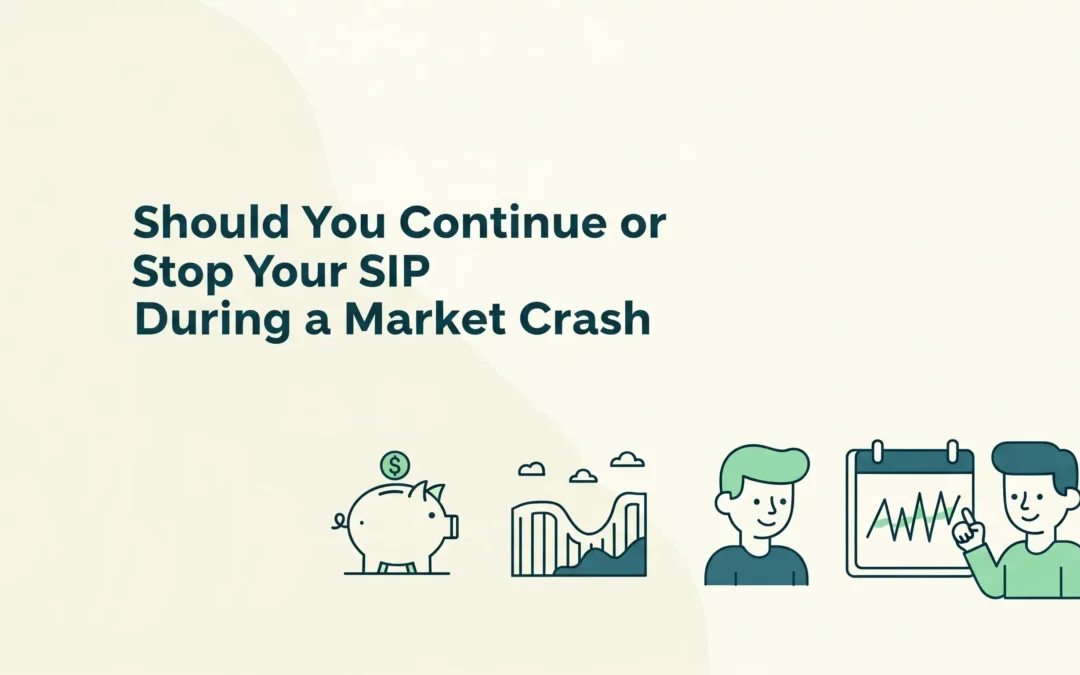With the increased accessibility to SIPs, people are starting to invest from an early age. It is a good thing that people are focusing on investment and savings. But, in most cases, people rush into making decisions without researching and planning. The lack of knowledge causes stress and fear at the time of a market crash, leading to decisions to stop their SIPs.
But is it the right decision? Should you continue your SIPs during a market crash or not? This article will help you understand when it is reasonable to stop your SIP and when you should avoid it.
How Do SIPs Get Affected in a Market Crash?
The net asset value (NAV) of mutual funds typically decreases during stock market crashes. You will observe a decline in the value of your portfolio if you are using SIPs to invest in equity mutual funds.
Rupee cost averaging is the principle that SIPs use to average the cost of units purchased in order to function over an extended period of time. This is how it functions:
| Month | SIP Amount | NAV (Rs. ) | Units Purchased |
| Jan | Rs. 5,000 | Rs. 50 | 100 units |
| Feb | Rs. 5,000 | Rs. 40 | 125 units |
| Mar | Rs. 5,000 | Rs. 30 | 166.67 units |
Over time, the average cost per unit decreases because you purchase more units at reduced prices when markets are down. When the market recovers, this benefits you and speeds up the growth of your portfolio.
Why You Should Not Stop SIPs in a Crash?
Let us look at the reasons for not stopping your SIPs during a crash:
1. You Lose the Chance to Purchase More Units at Reduced Costs
NAVs for mutual funds decrease when the market declines. This implies that you purchase more units for the same amount.
For instance, a SIP of Rs. 5,000 will yield 166.67 units rather than just 100 if the NAV falls from Rs. 50 to Rs. 30. The value of those additional units increases more quickly when the market recovers, increasing total returns.
2. You Break the Long-Term Chain of Compounding
Time and consistency are key to compounding SIP success. The power of compounding can be impacted by even a brief break.
Assuming a 12% annual return on an investment of Rs. 5,000 per month for 20 years, you’ll earn about Rs. 50 lakhs. But, the final value decreases by Rs. 6–7 lakhs if two years are skipped during a crash.
3. It’s Hard to Time the Market
SIPs are frequently paused with the intention of “restarting when the market improves.” However, nobody knows when the recovery will begin.
Typically, markets recover abruptly and sharply. You risk missing the early upside, which makes up a significant portion of future gains, if you have stopped investing.
4. It Promotes Emotional Judgement
Logic, not emotion, should guide your investing decisions. Stopping SIPs out of panic or fear encourages rash behaviour, which may result in bad financial choices in the future.
Even when the market appears threatening, a disciplined SIP investor learns to maintain composure, endure volatility, and follow the plan.
5. Market Crash is Temporary
The majority of SIP investors invest to achieve long-term objectives like retirement, home ownership, or their kids’ education.
A market crash is only a temporary setback. The market’s decline will recover after some time, and it is not permanent. If you stop investing in crash, you might need to:
- Make larger investments later.
- Compromise on your financial objectives.
- Give up on your goals.
When to Pause SIPs?
There are some cases where pausing your SIPs may make sense. Let us look at them:
1. Dealing with an Immediate Financial Crisis
A family crisis, unexpected medical bills, or a job loss can all disrupt your cash flow. Pausing your SIP can give you some short-term financial breathing room if your income has stopped or your expenses have increased dramatically.
For instance, continuing SIPs could result in debt if you lose your job and have a small emergency fund. SIPs should be put on hold for a few months in such a situation so that you can concentrate on bringing your finances under control.
2. Your Portfolio Needs to Be Rebalanced
Assume that you have been investing in equity mutual funds, but that your risk tolerance has changed as a result of a significant expense, a change in your objectives, or the approach to retirement. In this instance, it is preferable to:
- Temporarily halt ongoing SIPs
- Transfer money to better options such as debt funds or hybrid funds.
3. Monthly Overcommitments
Setting up SIPs in several funds without adequate budgeting can occasionally cause people to overcommit. It’s acceptable to stop, reevaluate, and cut back on SIPs if they begin to interfere with your basic needs or mental health.
Plan wisely before starting an SIP. Measure your capability to save after spending on necessities, then only plan for investment. Cutting back on necessities just to invest can be very stressful and burdensome in the long run.
Bottomline
The conclusion can be drawn that the market is volatile, and hence it is not possible to always make gains. Market crashes are a part of the market cycle, which is temporary in nature. Panick-selling or quitting SIPs can be a wrong decision and interpreted with your financial objectives. However, certain cases of emergencies or immediate need for money are valid reasons to pause your SIP.
It is important to analyse your situation and make your decision accordingly.


